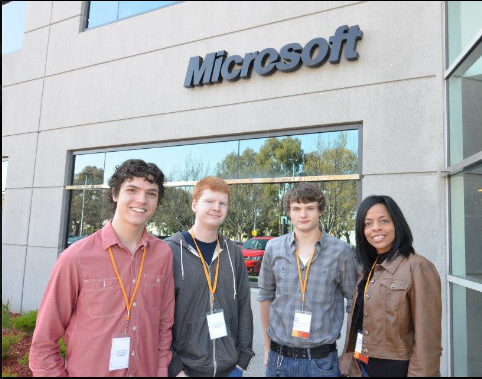Students create app, head to Microsoft finals
Students from two UALR colleges developed an app so unique they impressed Silicon Valley executives enough to become one of only 13 teams in the nation to advance to the 11th annual Microsoft Imagine Cup U.S. Finals to be held May 13.
Team Verbatim Signers designed an application that bridges the gap between the hearing and the deaf by using Microsoft’s Xbox Kinect system, to interpret and translate American Sign Language into both written and spoken text improving two-way communication for the hearing impaired.
The UALR team hopes to impress the judges because they believe the idea could solve certain challenges faced by people with impaired hearing
across the globe. During the May 13 demo, team members will pitch their concept to potential investors, as well as public relations and tech industry professionals.
College of Business Management Information Systems students Alec Crow and Latwana (Teresa) Scaife joined College of Engineering students Kori Gills and Zachary Lovin to form the team.
The team received the Accelerator Program’s World Citizenship award as part of the overall 2013 Imagine Cup Competition. Two additional awards went to different teams in the areas of Innovation and Games.
The idea stemmed from a team member who noticed there was no such technology available while working at the Arkansas School for the Deaf and the Blind.
“Although there is a way to translate text into American Sign Language, there was no way to reverse that, to take sign language and turn it into text and spoken word,” said Crow.
Crow said the judges will be looking for such things as the idea’s potential impact, creativity, and the team’s ability to see the project through to its appropriate conclusion.
The team leaves on May 11 for the all-expense paid trip to Microsoft’s Silicon Valley headquarters, where they will receive their trophy and $2,000. Soon they will hear whether they can advance to the world competition, to be held in June in Russia.
“If we are fortunate enough to win in Russia, our team gets another $50,000 to help offset our start-up costs,” said Crow.
“This particular team created an app that a number of people said couldn’t be done,” said Janet Bailey, associate professor of management. “They have proven that it can be done, which is truly exciting. I could not be prouder of what they have accomplished.”
Starting last fall, teams from around the nation vied for an opportunity to compete in the Microsoft Accelerator Program. The top 50 college teams were selected last January, and, following a second round of elimination, 15 teams were invited to Microsoft’s Startup Bootcamp at the company’s Silicon Valley campus in March.
While there, the students collaborated with seasoned experts and learned practical steps for making their startup a reality. Microsoft covered the cost of the students’ travel, food, and hotel for the bootcamp.
The return trip this May isn’t the first time UALR has done exceedingly well in Microsoft competitions.
“This is the premier technology competition in which students from about 190 countries participate,” said Bailey. “Last year, 90,000 competed and UALR placed third in the Microsoft Cup competition.”
Crow was a member of the only U.S. team last year to make it to the world semi-finals in the Microsoft Windows Phone category. Their application turned the Windows smartphone into a virtual fitness trainer.
Bailey said this competition represents the fifth time UALR teams have reached the top levels, and of those five, two have made it to the Imagine World Cup.
She put the accomplishment in perspective, saying that when UALR competes so well against competitors from Ivy League teams such as Harvard or Massachusetts Institute of Technology, “it just proves the quality of education and students at UALR.”
“We have the best students in the world and they repeatedly prove it. I have no problem bragging about them,” Bailey said.
The Imagine Cup, now in its 11th year, is the world’s premier student technology competition. Its goal is to honor student technology innovations that address the world’s toughest problems.
